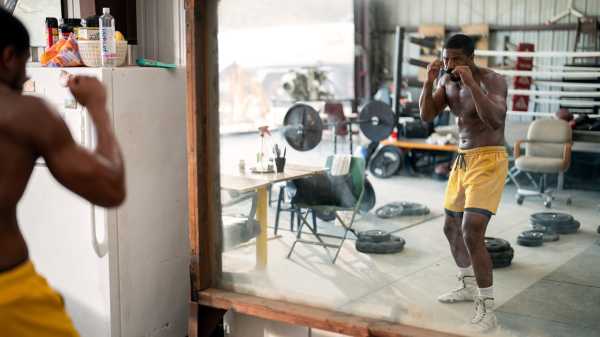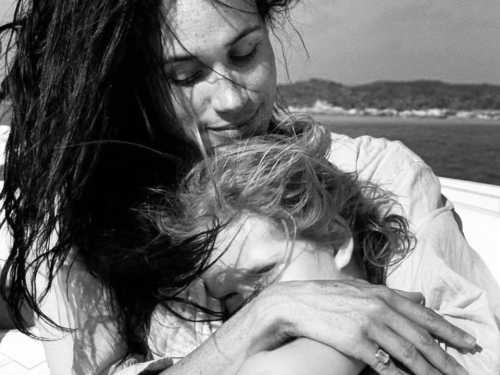
Though the multiplexes are drowning in sequels, “Creed III” should have been split into two movies, yielding the third and fourth installments in the franchise. Many franchise films are needlessly long, but this one ought to have been longer. The new movie’s sense of undue brevity and haste is a result of its diminished connection to the “Rocky” cycle, of which the “Creed” series is a reboot. Sylvester Stallone and his signature character are major presences in the first two “Creed” films but completely absent from “Creed III.” Instead, the new film develops a mythology of its own—a separate framework, involving an immense infrastructure of backstory that takes up lots of screen time and crowds out crucial aspects of the characters’ present-tense activities. That’s why “Creed III” isn’t long enough; the material deserves more detailed dramatic attention and, in any case, is too copious for one film. Strangely, the tension between past and present, the power of the past to dominate the present, is the movie’s main theme and ideological focus.
“Creed III,” which opens Friday, again stars Michael B. Jordan in the title role of Adonis Creed, the biological son of Rocky’s rival Apollo Creed and the adoptive son of Apollo’s widow, Mary Anne (Phylicia Rashad); this time, Jordan also directs. The new film circles back to the opening, and the backstory, of the first film: Adonis’s troubled childhood years in a group home. In “Creed,” young Adonis, who’s bullied, fights back and gets in trouble for it; “Creed III” is centered on Adonis’s relationship with his roommate there, Damian (Dame) Anderson, who’s a few years older. In the movie’s first sequence, set in Los Angeles in 2002, the teen-age Adonis (Thaddeus J. Mixson) has an unfortunate chance encounter that leads to violence. Dame (Spence Moore II), defending Adonis, gets arrested, and Adonis gets away. Adonis goes on to lead the life that’s dramatized in the other two films: he becomes a professional boxer and wins the world heavyweight championship, he marries a musician named Bianca Taylor (Tessa Thompson), and they have a daughter named Amara.
Now, in present-day Los Angeles, Adonis owns a boxing gym and manages a stable of fighters, including the current champ. He’s a kingmaker of boxing, and he lives royally, with wealth and respect, wearing fine clothes and fancy watches, and living with his family in a posh house high on a hill. Then Dame shows up—newly released from prison after eighteen years, in training the whole time—and he wants Adonis to take him on as a fighter. What’s more, Dame (now played by Jonathan Majors) wants Adonis to give him a title shot, without making him box his way up the ranks. Adonis is dubious, but he has a double motive: both a businessman’s sense of a marketable spectacle (the classic “Rocky”-like underdog story) and a guilty feeling of owing Dame big time. He makes it happen.
Spoiler alert: bitter enmity erupts between the two men, fuelled by the difference in their life paths and by unresolved issues regarding the fateful night in 2002. To save his name, his business, his pride, and even his soul, Adonis—who is long retired from boxing—decides to challenge Dame in a big-time bout, and to endure the rigorous training that the return to the ring entails.
Jordan, as director, delivers a captivating blend of explosive energy and melodramatic intensity; he sharpens the stark lines of conflict with keen attention to performance (marked, above all, by tense closeups) and a controlled, storm-like feeling of moods building to crises. One of those crucial crises, a fulcrum of passion and action, involves the marriage of Adonis and Bianca. Thompson is, once again, a distinctive presence who gives her every line of dialogue and gesture a seemingly sculptural depth. Bianca, an accomplished singer and songwriter, is experiencing progressive hearing loss; as a result, she has now largely abandoned performing, trading it in for a career as a producer of records featuring other singers singing her songs. (Amara was born deaf, and A.S.L. is used in the Creed/Taylor household.) The marriage appears solid, but tension arises after Dame turns up, because, surprisingly and significantly, Adonis hadn’t spoken about him, or about the years in a group home that brought them together, or the catastrophic night in 2002 that separated them.
In “Creed,” directed by Ryan Coogler, the underlying subject is the exceptional chance that Adonis gets—and American society’s all-too-usual abandonment of far too many young people raised in similarly hard circumstances. The idea is rendered agonizingly clear in “Creed III” through the destinies of Adonis, and of Dame. This burden of the unresolved past is the motor of the action in “Creed III,” and on two fronts: Adonis is forced by Dame’s arrival to reckon with his own past, and, in order to save his marriage, he is forced to lift the blockade that he has built to keep that past out.
The crushing weight of the past, and the exposition of its dramatic import, crowds off the screen many of the salient details of Adonis’s current-day activities. His business gets dispatched with only a few quick scenes and superficial nods. Dame jokes with Bianca that Adonis is working like Don King, but the movie shows even less of the wide-ranging wiles of boxing management and negotiation than does the relatively superficial and manufactured “Creed II.” The key trainer in Creed’s employ is Little Duke (Wood Harris), and he and Adonis have differences on whether to bring Dame into the stable, but the matter is papered over, as is the matter of who will train him, and what goes into his physical and mental preparation for his first professional fight. Though Jordan delights in scenes filmed in the ring and brings a graphic pictorialism to the dramatized bouts, there’s little attention to strategy, little discussion of who’s doing what to whom, how and why and to what effect. Training sessions are shown as hectic montages of merely anecdotal interest, with scant consideration to the art of boxing.
The most conspicuous omissions, though, involve Adonis and Bianca’s relationship. Here, too, the movie offers plenty of charming household incidentals, as with Amara’s desire to take up boxing and Adonis’s willingness to teach her behind Bianca’s back. But when the relationship enters a critical stage its onscreen depiction thins out to the vanishing point. Bianca hints that she’ll consider a separation if Adonis doesn’t come to grips with his past, doesn’t express his emotions, doesn’t face up to his experiences. But does he consult a therapist? Does he seek the counsel of clergy? Does he open up to a friend?
Midway through the film, as the details of Adonis and Dame’s shared past dribble out with a coyly calculated air of mystery, I felt that something was up—that, in their relationship and, even more, in Adonis’s inner relationship to that relationship, the movie was in the process of disclosing a higher principle regarding manhood, maleness. (I knew then that the movie would end with an aggrandizing closeup of Adonis; I was right.) “Creed III” implies that there’s something distinctively feminine, womanish, about working through the past in detail, in recollecting, reconsidering, reëxperiencing, and analyzing its emotions. In eliding most of the substance of Adonis’s domestic life, it keeps the movie’s attention on the public realm, the man’s world. (The gendering is lightly blurred by Amara’s fighting spirit and by a female boxer with whom Adonis trains but who has no dialogue.)
Of course, “Creed III” is a boxing drama, and resolutions inevitably boil down to what happens in the ring. But, pointedly, Adonis seeks emotional resolution by way of a brand of results-oriented psychology that replaces a working through of the past with punching his way out of it—and into reconciliation with himself. Adonis never acknowledges Bianca’s concerns about his silence, his struggles with his past, or how those struggles affect their relationship; rather, he tries to justify his past—and his silence about it—by way of victory. He takes for granted that she’ll be satisfied by the outcome and, with no questions asked, follow along.
The movie’s implicit discourse on manhood finds a powerful, yet perhaps ironic, correlate in the contrast between the impressive performances of Jordan and Majors. Jordan’s Adonis has a metallic, statue-like grandeur and solidity. Majors plays the newly freed Dame as pain-racked and brutalized. The wail of his abused spirit seems to well up subtly in his eyes, the weight of endured indignities seems to bow his shoulders and furrow his brow. The soulfulness of his pain, however, burns away in the fire of his combat in the ring, and Dame’s resulting transformation—albeit an all-too-rapid and unconsidered one—turns the screen into a mirror and asks viewers what kind of Black men they want to take as heroes and why, and what the nature of such male heroism is. “Creed III” makes clear that Jordan, in directing and starring, has serious matters, personal and professional and societal, in mind. But the movie, produced as one briskly overpacked feature, doesn’t allow him enough time to explore them. ♦
Sourse: newyorker.com






